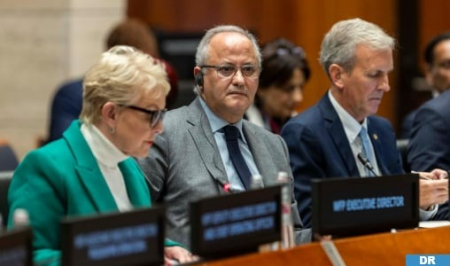Morocco Chairs 2nd Regular Session of WFP Executive Board in Rome
The 2nd regular session of the Executive Board of the World Food Programme (WFP) kicked off on Monday in Rome, under the chairmanship of Morocco’s Permanent Representative to the UN agencies in Rome, Ambassador Youssef Balla. This session marks a major step at global level in the fight against food insecurity and in favor of promoting resilient and sustainable food systems, Balla told MAP. Morocco, as coordinator of African countries, continues efforts to put forward African priorities on an international scale, the diplomat stated, noting that this session will be marked by the adoption and examination of several countries’ strategic plan, namely the strategic plan for Senegal (2025-2029), as well as the evaluation reports of initiatives carried out in Mali and Rwanda. The adoption of these documents, he continued, illustrates Africa’s commitment to finding appropriate, sustainable solutions to food security challenges. During this session, held until November 21, important debates are scheduled on themes such as resilience, climate change and WFP’s school meals policies. The aim is to learn from past initiatives and align the agency’s future strategies with regional needs and global priorities, particularly in Gaza, Sudan, the Sahel, East Africa and Haiti. Under Moroccan chairmanship, WFP’s Board will approve the report of the Governance Review working group, the ambassador noted, pointing out that this review is WFP’s most important process over the last two decades. Morocco played an active role in this working group, which prepared the report on reviewing all recommendations made by the independent consultant on WFP governance, published in May 2023, he added. During this session, Morocco’s presidency will reaffirm its determination to defend African interests and strengthen its commitment to inclusive and sustainable solutions for challenges of food security in Africa and worldwide, Balla enthused. It will also reiterate the importance of strengthening WFP’s good governance, and the need to adopt decisions in an inclusive and transparent manner, with a view to ensuring greater coherence between recommendations made in the report and WFP’s institutional ambitions, the diplomat added. Each year, WFP’s Executive Board holds two ordinary sessions and one annual session to discuss strategic documents and approve policies, programs and budgets relating to WFP activities worldwide.

